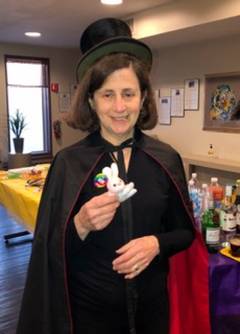Eikev 5779: From "Them" to "Us"
08/25/2019 02:23:51 PM
Aug25
| Author | |
| Date Added | |
| Automatically create summary | |
| Summary |
There's an image that has made the rounds in recent months in Jewish spaces online. It's a still from an online video series that teaches basic Yiddish. As a sample sentence to demonstrate some grammatical point, it flashes the phrase, “the Jews are tired.”
And boy, am I tired after this week. I'm tired of dealing with everything that comes with being a Jew in America in 2019. I'm tired of the low-grade anxiety I have every day that my workplace, this synagogue, could become a target for the next anti-Semitic mass shooting. I'm tired of the ongoing terrorism against Israeli Jews that this week claimed the life of 17 year old Rina Shnerb. I'm tired of members of Congress who refuse to listen to legitimate criticism about the ways they talk about Jews and the State of Israel. And I'm tired of having to listen to the President of the United States outrageously accuse the majority of American Jews of being “disloyal” to Israel and the Jewish people.
Since I brought it up, let me say this: Republicans, especially Jewish Republicans, have long asserted that American Jews, whom surveys show overwhelmingly vote for Democrats, would be better served by voting for Republicans. They are certainly welcome to make that case and advocate their point of view. But it is quite another thing, especially for a non-Jewish politician, to say that Jews who support Democrats are disloyal to Israel or to the Jewish people. As Americans and as Jews, we can handle policy disagreements, even fierce ones. It's something else altogether, though, to denigrate the character of entire groups.
But mostly, after this week, I'm tired of the Jewish people being tossed around like a football in in American political discourse. I'm tired of how the extremes of the American political spectrum reinforce and embolden one another, in what Israeli journalist David Horowitz called a “Dreadful symbiosis [that] sees Israel and Jews pulled into [the] volcanic core of US politics. ”
So, I'm tired of non-Jewish politicians talking about “the Jews” in the third person. I'm tired of those politicians pointing to their own Jewish supporters as cover for their antisemitism, making an implicit and anti-Semitic distinction between the “good Jews” who agree with them and the “bad Jews” who do not. “Some of my best friends are Jews,” is no excuse for trafficking in anti-Semitic ideas and imagery.
Or, as Rabbi Dr. Ariel Burger, a close student of Elie Wiesel's, wrote this week, “We have been co-opted, used as pawns in other times, other places, and it never ended well for us. …It always starts with the third person. “They”. They secretly control us. They are disloyal. They are on the wrong side of this or that political test, this or that high-stakes battle of succession, this or that war over land or language.”
So, as Jews, how do we respond to this moment? Rabbi Burger suggests that we have to turn a conversion about “them” into a conversation about “us.” We have to loudly and clearly narrate our own story, in order to crowd out the voices of powerful non-Jews who would define us to suit their own political ends. As Rabbi Burger puts it, ““We” is a sacred word, one that, in our isolation, is difficult to say. But we are not alone. We are a community. We have our own story to tell, and we don't need anyone telling our story for us.”
The question for us, then, is how should we define ourselves? What story should we tell ourselves and our neighbors about who we are in the world?
An answer might come this week's Torah portion, Eikev. In it, Moses summarizes the principles that are to guide the people as they create their own society in the land of Israel. Moses tells the people as follows: “Mark, the heavens to their uttermost reaches belong to the LORD your God, the earth and all that is on it! Yet it was to your fathers that the LORD was drawn in His love for them, so that He chose you, their lineal descendants, from among all peoples” (Deut. 10: 14).
In other words, the God to whom belongs the entire universe fell in love with, of all people, our ancestors. This could lead to a sense of superiority, to a sense that we are better than others because of that Divine choice, or that we get a free pass and can be held to a lower moral standard.
On the contrary, though, the next verses call upon the people to set aside the stubbornness and disobedience that they displayed throughout their trek through the desert. “Cut away, therefore, the thickening about your hearts and stiffen your necks no more,” Moses tells them. God's love and choice of them requires a higher moral standard. God's love requires that the people do the hard work necessary to fully walk the path that God has laid out for them.
Moses continues, reiterating the point: “For the LORD your God is God supreme and Lord supreme, the great, the mighty, and the awesome God, who shows no favor and takes no bribe, but upholds the cause of the fatherless and the widow, and befriends the stranger, providing him with food and clothing.�"You too must befriend the stranger, for you were strangers in the land of Egypt.” (Deut. 10: 17-9).
As those verses tell it, God is, on the one hand, an imperial and disinterested judge of humanity. God is elevated high above ordinary human reality, neither showing favor nor taking bribes the way a human judge might. And yet, God is also passionately interested in the fate of those most vulnerable to abuse: the orphan, the widow, and the resident alien. So, as this passage depicts it, God is both high above but also intimately involved in human affairs (see Robert Alter's commentary on the passage.).
The corollary of this, then, is the next verse: that we are to emulate God's love of the stranger, having been strangers ourselves in the land of Egypt. One might think that being chosen by such a high and mighty God would come with the right to subject and oppress others who were not so chosen. But just the opposite is the case. God love for us is expressed in our own love of the weak and the vulnerable and the outsider.
So, putting this all together, we arrive at one story we might tell about ourselves. Who are we? We are the descendants of some extraordinary people whom God invited to be in special relationship. This came with some privileges, but mostly with hardship and responsibility. We were enslaved in Egypt, but God took us out of there in order to create a new society focused on compassion for the weak, a society that would be the opposite of Egypt. Over time we lived up this vision to greater and lesser extents. Eventually we lost that homeland, but we spread out all over the world, creating vibrant communities wherever we went, holding on to our traditions and values, often under very trying circumstances. We cared about our fellow Jews and also about the world around us, which is at times a tricky balancing act. But who said being Jewish was easy?
At a time when people in power talk about “the Jews” as a means to their own ends, we have to take back our own narrative. Only Jews get to define the meaning of our existence, and we have 3,000 years of tradition to guide the way. May we merit to do so.
Fri, October 31 2025
9 Cheshvan 5786
Photo Gallery
Photo Albums
Fri, October 31 2025 9 Cheshvan 5786
Upcoming Events
All Events
-
Saturday ,
NovNovember 1 , 2025Dror Israel Shabbat
Shabbat, Nov 1st 11:30a
Dror Israel Shabbat Dror Israel’s Mirit Sulema, along with two leaders of the Arab Youth Movement NOAL, Tal Tunik and Shadi Habiballa, will speak during a Kiddush lunch about their important work with Arab Israeli youth and bringing Jewish, Arab, and Druze youth together. Saturday, November 1st, approx. 11:30am KTI Social Hall "We eat together, laugh together. We talk about what we think of each other, and what will help bring peace.” RSVP Appreciated -
Saturday ,
NovNovember 1 , 2025KTI Gala - A November to Remember Digital Journal
Motzei Shabbat, Nov 1st 7:00p to 10:00p
-
Saturday ,
NovNovember 1 , 2025KTI Gala - A November to Remember
Motzei Shabbat, Nov 1st 7:00p to 10:00p
Saturday, November 1, 2025, 7:00 PM - 10:00 PM Harrison Meadows -
Wednesday ,
NovNovember 5 , 2025Rabbi, May I? Modern Responsa
Wednesday, Nov 5th 10:00a to 11:30a
Wednesdays, 10 - 11:30 AM, KTI Library Ever since Abraham’s famous argument with God, Judaism has been full of debate. Moses and Korah, David and Nathan, Hillel and Shammai, the Vilna Gaon and the Ba’al Shem Tov, Spinoza and the Amsterdam Rabbis . . . the list goes on. No wonder that Judaism cherishes the expression machloket l’shem shamayim, “an argument for the sake of heaven.” Beyond their historical importance, what makes these disputations so compelling is that nearly all of them, regardless of their epochs, are still being argued. The parade of characters spanning three millennia of biblical, rabbinic, and modern disputation reflects the panorama of Jewish history with its monumental political, ethical, and spiritual challenges. This series will examine Jewish responses to exile from the biblical period to our modern day. Considering texts from all genres of Jewish literary creativity, we will explore how the realities and iterpretaions Join as we re-open these timeless debates that lead us to the core of 3,000 years of Jewish conversation. • Justice: Abraham vs. God (October 19) • Holiness and Authority: Moses vs. Korah (November 9) • Inclusion: The Five Daughters vs. the Twelve Tribes (November 30) • Accountability and Morality: David vs. Nathan (December 21) • Resistance: Ben Zakkai vs. the Zealots (January 18) • Law: Hillel vs. Shammai (February 15) • Spirituality: The Vilna Gaon vs. the Baal Shem Tov (March 15) • Boundaries: Spinoza vs. the Amsterdam Rabbis (April 19) • Religious Evolution: Geiger vs. Hirsch vs. Frankel (May 10) • Zionism: Herzl vs. Wise (May 31) -
Thursday ,
NovNovember 6 , 2025Coffee with the Rabbi
Thursday, Nov 6th 8:00a to 9:00a
Start your morning with some caffeine and casual or meaningful conversation! Join Rabbi Goldberg for a Coffee Chat! Stop by Rye Ridge Starbucks any of the following Thursdays, between 8-9am: June 12 and 26 July 10 and 24 August 7 and 21 September 4 and 18 October 16 and 30 November 6 and 20 December 4 and 18
Privacy Settings | Privacy Policy | Member Terms
©2025 All rights reserved. Find out more about ShulCloud






